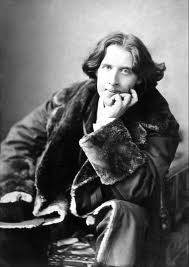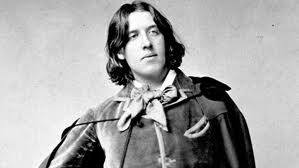Oscar Wilde


Born Oct 16, 1854 Died Nov 30, 1900
Oscar Fingal O'Flahertie Wills Wilde was an Irish writer
Always forgive your enemies - nothing annoys them so much.
I am so clever that sometimes I don't understand a single word of what I am saying.
Experience is simply the name we give our mistakes.
The only way to get rid of temptation is to yield to it... I can resist everything but temptation.
A gentleman is one who never hurts anyone's feelings unintentionally.
I choose my friends for their good looks, my acquaintances for their good characters, and my enemies for their intellects.
A man cannot be too careful in the choice of his enemies.
One should always be in love. That is the reason one should never marry.
There are only two tragedies in life: one is not getting what one wants, and the other is getting it.
A man who does not think for himself does not think at all.
I have the simplest tastes. I am always satisfied with the best.
Fashion is a form of ugliness so intolerable that we have to alter it every six months.
No man is rich enough to buy back his past.
As long as a woman can look ten years younger than her own daughter, she is perfectly satisfied.
What is a cynic? A man who knows the price of everything and the value of nothing.
Woman begins by resisting a man's advances and ends by blocking his retreat.
Perhaps, after all, America never has been discovered. I myself would say that it had merely been detected.
Consistency is the last refuge of the unimaginative.
Pessimist: One who, when he has the choice of two evils, chooses both.
Those whom the gods love grow young.
There is no sin except stupidity.
Oscar Fingal O'Flahertie Wills Wilde (16 October 1854 - 30 November 1900) was an Irish writer
Only the shallow know themselves.
The well bred contradict other people. The wise contradict themselves.
The true mystery of the world is the visible, not the invisible.
It is better to have a permanent income than to be fascinating.
One should always play fairly when one has the winning cards.
There is no necessity to separate the monarch from the mob; all authority is equally bad.
It is only an auctioneer who can equally and impartially admire all schools of art.
The salesman knows nothing of what he is selling save that he is charging a great deal too much for it.
Wilde's parents were successful Dublin intellectuals. Their son became fluent in French and German early in life. At the university Wilde read Greats
At the turn of the 1890s, he refined his ideas about the supremacy of art in a series of dialogues and essays, and incorporated themes of decadence, duplicity, and beauty into his only novel, The Picture of Dorian Gray
At the height of his fame and success, while his masterpiece, The Importance of Being Earnest
Died 30 November 1900 (aged 46) Paris, France
Occupation Writer
Language English, French
Nationality Irish
Alma mater Trinity College, Dublin
Period Victorian era
Genres Drama, short story, dialogue, journalism
Literary movement Aestheticism
Notable work(s) The Importance of Being Earnest
Spouse(s) Constance Lloyd
Children Cyril Holland
Relative(s) Sir William Wilde